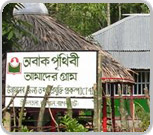More About Amader Gram

The Amader Gram is an innovative project and as a social innovation first of its kind in the country. Through this project there is a formal way of collecting, preserving and even re-sourcing data on so many things both in respect of project's own activities and beyond, instead of letting thousands of everyday data get lost. On the contrary, the Statistical Department of Government does not have any regular mechanism to collect/preserve data on our villages. Of course, in some of the upazila (sub-district), Government has branches of the Statistical department with only one officer (remain absent most of the time) and does not have any ICT facilities. So, introducing a formal/disciplined set-up of collecting and preserving data of the village society (as an on-going process), may be exemplary against the present mechanism of the government's data keeping way. Not only local data keeping, there are scopes of data generation also. Data is being collected and kept for its generation and uses. At the one hand the collected data is documenting the day-to-day changes in villagers' lives. On the other hand, the stored data will generate lot of many other data those can be used for the acceleration in further changing of the living status of the villagers. For example the data related to micro-credit activities is providing information on potential Income Generating Activity (IGA) sectors and on the ways of access to credit and other supports so that the entrepreneurs can take quick and appropriate steps for undertaking suitable projects. A database on credit provides information on the amount of credit installment, rate of interest, sources of credit, recovery procedure etc.- all those can help in breaking the deadlock and gain confidence towards micro-credit access for the silent majority.
Simultaneously the database on training (knowledge transfer) can be effective by providing information on training courses, trainers, training cost, and training resources –all those can contribute in growing up of a skilled human force within the rural community. We believe that skilled manpower is a pre-requisite for the successful implementation of income generating programs by utilizing any amount of credit. Training on leadership, group dynamism, accounts keeping, program monitoring, marketing are some of the identified area where people are yet to be developed on. Fair and uninterrupted access to credit and its proper utilization will create a large number of entrepreneurs, the number certainly contribute to the efforts of other development actors in GO-NGO sectors –who are working on the same cause in the same area.
Data linkages to the schools may need some elaboration. Because, not only the data on school going children, but also on the dropout children, their causes of being dropout and other socio-economic features will be stored. This storage can help to set-up future plan for the enrollment of dropouts and to choose the suitable education package (whether technical or non-technical) for them. If it is addressed properly, the dropout rates may be prevented which is very much part of the poverty reduction strategies of the country.
As for linkages of the information flow to local government , here it is important to mention that in “Amader Gram” project area BFES is not only the actor, there are other development actors like local government departments, local elected bodies, elite – all are working towards the same mission: Poverty Reduction. At Upazila level, there is a central development committee in which GO and NGOs are the partners and complementary to each other for the same cause. Now it is needed to blend all the stakeholders and ensure their participation.
The primary users of those data are the beneficiaries of ‘Amader Gram' project. In fact, they are the owners. Getting access to information and having the ownership, the beneficiaries have great privilege to monitor the other actors' role in reducing the poverty in the area. Beneficiaries (primary users) can help by giving regular feedback on the development activity progress, to central development committee and thus can help in the planning process and finding out a common strategy (by the stakeholders) towards poverty reduction in the area.
As well, while the beneficiaries are the primary users of the database, the government people, researchers, local leaders, teachers, religious leaders and other stakeholders may be the secondary users by which they can improve, rectify and upgrade themselves.
The above information on database activities to poverty reduction strategies is linked with their outcomes. A disciplined process of data collection and analysis on credit and skill development training widen the scopes of employment. Women, unemployed youth and seasonal workers can have options for employment . Availability of data will not only help by presenting the increasing number of ultra poor, but also prevent the poor class to become ultra poor. On the contrary, it will show some innovative means, ideas and technologies. (As for example, information on availability and variations of seeds and related technology may show a farmer new ways to utilize his fallow land or to cultivate additional crops after harvesting of normal crops. Data on marketing may help the farmers inspiring cultivation of year - round crops, develops selling centers, vegetable/fruit processing and many other agro-based initiatives). Those data will be effective to feed up different professional groups. Access to data base to different stakeholders will help formulating common plan basing on a common context analysis which will contribute to poverty reduction efforts, by avoiding duplications.
While the increasing unemployment is a vital cause of poverty, the skilled ICT users can increase the number of entrepreneurs by holding computer centers, either individual or group level, using the micro-credit support. A good number of skilled youth can start earning by selling training to the others and by doing repairing and trouble shooting job.
he ICT based education at village level is helping people to communicate independently and to get scopes of distance learning. This scope will improve the quality and accelerate the rate of education in the area.
